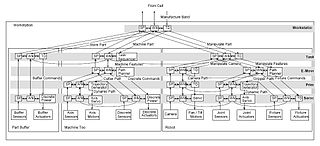Related Research Articles

In the industrial design field of human–computer interaction, a user interface (UI) is the space where interactions between humans and machines occur. The goal of this interaction is to allow effective operation and control of the machine from the human end, while the machine simultaneously feeds back information that aids the operators' decision-making process. Examples of this broad concept of user interfaces include the interactive aspects of computer operating systems, hand tools, heavy machinery operator controls and process controls. The design considerations applicable when creating user interfaces are related to, or involve such disciplines as, ergonomics and psychology.

Automation describes a wide range of technologies that reduce human intervention in processes, mainly by predetermining decision criteria, subprocess relationships, and related actions, as well as embodying those predeterminations in machines. Automation has been achieved by various means including mechanical, hydraulic, pneumatic, electrical, electronic devices, and computers, usually in combination. Complicated systems, such as modern factories, airplanes, and ships typically use combinations of all of these techniques. The benefit of automation includes labor savings, reducing waste, savings in electricity costs, savings in material costs, and improvements to quality, accuracy, and precision.
Mechatronics engineering, also called mechatronics, is an interdisciplinary branch of engineering that focuses on the integration of mechanical engineering, electrical engineering, electronic engineering and software engineering, and also includes a combination of robotics, computer science, telecommunications, systems, control, automation and product engineering.
The following outline is provided as an overview of and topical guide to human–computer interaction:
Human-centered computing (HCC) studies the design, development, and deployment of mixed-initiative human-computer systems. It is emerged from the convergence of multiple disciplines that are concerned both with understanding human beings and with the design of computational artifacts. Human-centered computing is closely related to human-computer interaction and information science. Human-centered computing is usually concerned with systems and practices of technology use while human-computer interaction is more focused on ergonomics and the usability of computing artifacts and information science is focused on practices surrounding the collection, manipulation, and use of information.
Thomas B. Sheridan is American professor of mechanical engineering and Applied Psychology Emeritus at the Massachusetts Institute of Technology. He is a pioneer of robotics and remote control technology.

The German Research Center for Artificial Intelligence is one of the world's largest nonprofit contract research institutes for software technology based on artificial intelligence (AI) methods. DFKI was founded in 1988, and has facilities in the German cities of Kaiserslautern, Saarbrücken, Lübeck, Oldenburg, Osnabrück, Bremen, Darmstadt and Berlin.
Jeff S. Shamma is an American control theorist. He is the Department Head and Professor of Industrial and Enterprise Systems Engineering at the University of Illinois Urbana-Champaign. Formerly, he was a Professor of Electrical engineering at the King Abdullah University of Science and Technology. Before that, he held the Julian T. Hightower Chair in Systems & Control Systems and Controls at the Georgia Institute of Technology. He is known for his early work in nonlinear and adaptive control, particularly on gain scheduling, robust control, and more recently, distributed systems.

Human–computer interaction (HCI) is research in the design and the use of computer technology, which focuses on the interfaces between people (users) and computers. HCI researchers observe the ways humans interact with computers and design technologies that allow humans to interact with computers in novel ways. A device that allows interaction between human being and a computer is known as a "Human-computer Interface (HCI)".

Real-time Control System (RCS) is a reference model architecture, suitable for many software-intensive, real-time computing control problem domains. It defines the types of functions needed in a real-time intelligent control system, and how these functions relate to each other.
Manfred Morari is a world-leading control theorist who has made pioneering contributions to the theory and applications of Model Predictive Control, Internal Model Control (IMC) and Hybrid Systems. His book on Robust Process Control is considered to be definitive text on the subject. He is currently Peter and Susanne Armstrong Faculty Fellow at the University of Pennsylvania. He received his Ph.D. in Chemical Engineering from the University of Minnesota in 1977. Dr. Morari held positions at the University of Wisconsin, Madison (1977–1983), the California Institute of Technology (1983-1991), and the Swiss Federal Institute of Technology in Zurich ETH Zurich. He is considered a pioneer in field of Model Predictive Control, Control of Hybrid Systems, Internal Model Control (IMC), and robust control.

The Turing Institute was an artificial intelligence laboratory in Glasgow, Scotland, between 1983 and 1994. The company undertook basic and applied research, working directly with large companies across Europe, the United States and Japan developing software as well as providing training, consultancy and information services.
Neville Moray was a British-born Canadian psychologist. He served as an academic and professor at the Department of Psychology of the University of Surrey, known from his 1959 research of the cocktail party effect.

Guy André Boy is a French and American scientist and engineer, Fellow of the International Council on Systems Engineering (INCOSE), the Air and Space Academy, and the International Academy of Astronautics. He is FlexTech chair holder at CentraleSupélec and ESTIA Institute of Technology. He is also a visiting scholar at ISAE-SUPAERO. He was a university professor and dean (2015–2017) at Florida Institute of Technology (FIT), where he created the Human-Centered Design Institute in 2010. He was senior research scientist at Florida Institute for Human and Machine Cognition (IHMC). He was Chief Scientist for Human-Centered Design at NASA Kennedy Space Center (KSC) from 2010 to 2016. He is known for his work on intelligent assistance, cognitive function analysis, human-centered design (HCD), orchestration of life-critical systems, tangible interactive systems, and human systems integration.
Instrumentation and control engineering (ICE) is a branch of engineering that studies the measurement and control of process variables, and the design and implementation of systems that incorporate them. Process variables include pressure, temperature, humidity, flow, pH, force and speed.

Antonio Bicchi is an Italian scientist interested in robotics and intelligent machines. He is professor at the University of Pisa and senior researcher at Istituto Italiano di Tecnologia in Genoa. He is an adjunct professor at the School of Biological and Health Systems Engineering of Arizona State University in Tempe, Arizona, US.
Ironies of Automation is a research paper written by Lisanne Bainbridge and published in Automatica in 1983, and has been widely recognized as a pioneering statement of the problems inherent in automation.
Katalin M. Hangos is a Hungarian chemical engineer whose research concerns control theory and chemical process modeling. She is a research professor in the Systems and Control Laboratory of the Institute for Computer Science and Control of the Hungarian Academy of Sciences, and a professor of electrical engineering and information systems at the University of Pannonia.
Cognitive systems engineering (CSE) is a field of study that examines the intersection of people, work, and technology, with a focus on safety-critical systems. The central tenet of cognitive systems engineering is that it views a collection of people and technology as a single unit that is capable of cognitive work, which is called a joint cognitive system.
Chandrajith Ashuboda "Ashu" Marasinghe is a Sri Lankan politician, professor and academic. He served as an advisor to Sri Lankan president Ranil Wickremesinghe and also served as a former member of parliament of Sri Lanka. He was a national list member of the Parliament of Sri Lanka proposed by United National Front following the 2015 Sri Lankan parliamentary election and subsequently served in the 15th Parliament of Sri Lanka as an MP.
References
- 1 2 3 Gunnar Johannsen, Professor em. Dr.-Ing. Dr.h.c. Systems Engineering and Human-Machine Systems, University of Kassel, Germany biography at gunnar-johannsen.de. Accessed March 13, 2014.
- ↑ The Project Synopses Advanced Information Processing. European Strategic Programme for Research and Development in Information Technology. Vol. 4. Directorate General XIll Telecommunications, Information Industries and Innovation Commission of the European Communities. 1988. pp. 38–39. Archived from the original on 2006-02-11. Retrieved 2014-03-12.
- ↑ Alty, G. & Johannsen (1989). "Knowledge Based Dialogue for Dynamic Systems". Automatica. 25 (6): 829–840. doi:10.1016/0005-1098(89)90051-4.
- ↑ Johannsen, J.L. & Alty (1991). "Knowledge Engineering for Industrial Expert Systems". Automatica. 27 (1): 97–114. doi:10.1016/0005-1098(91)90009-Q.
- ↑ Alty, J.L.; Bergan, M.; Craufurd, P.; Dolphin, C (1993). "Experiments using multimedia interfaces in process control: some initial results". Computers and Graphics. 17 (3): 205–218. doi:10.1016/0097-8493(93)90069-L. ISSN 0097-8493 . Retrieved January 4, 2014.